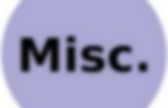

Hacking Knowledge: 77 Ways To Learn Faster, Deeper, & Better. If someone granted you one wish, what do you imagine you would want out of life that you haven’t gotten yet?
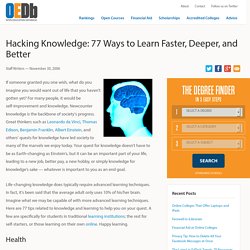
For many people, it would be self-improvement and knowledge. Newcounter knowledge is the backbone of society’s progress. Great thinkers such as Leonardo da Vinci, Thomas Edison, Benjamin Franklin, Albert Einstein, and others’ quests for knowledge have led society to many of the marvels we enjoy today. Your quest for knowledge doesn’t have to be as Earth-changing as Einstein’s, but it can be an important part of your life, leading to a new job, better pay, a new hobby, or simply knowledge for knowledge’s sake — whatever is important to you as an end goal. Life-changing knowledge does typically require advanced learning techniques. Health Shake a leg. Balance Sleep on it. Perspective and Focus Change your focus, part 2. Recall Techniques. Mind Tools.
How To Learn Without Memorizing. Photo by Edwin Stemp Rote memorization is an inefficient way to learn.

Just retaining a single formula can mean pounding the same information into your skull dozens of times. How To Memorize Things Quickly. People like to joke that the only thing you really “learn” in school is how to memorize.
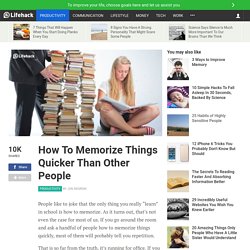
As it turns out, that’s not even the case for most of us. If you go around the room and ask a handful of people how to memorize things quickly, most of them will probably tell you repetition. That is so far from the truth, it’s running for office. If you want to memorize something quickly and thoroughly, repetition won’t cut it; however, recalling something will.
The problem is that recalling something requires learning, and we all learn in different ways. Memorizing Dates - How To Remember Dates For A Test. Dates are often difficult to remember because they seem so random and obscure unless we can relate them to something specific.
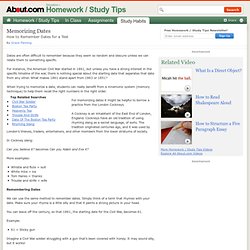
For instance, the American Civil War started in 1861, but unless you have a strong interest in the specific timeline of the war, there is nothing special about the starting date that separates that date from any other. What makes 1861 stand apart from 1863 or 1851? When trying to memorize a date, students can really benefit from a mnemonic system (memory technique) to help them recall the right numbers in the right order.
How I Study In An Organized Way. I'm super crazy about organization.
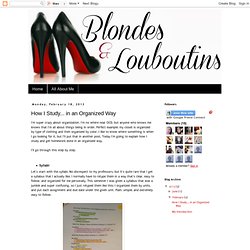
I'm no where near OCD, but anyone who knows me knows that I'm all about things being in order. Perfect example: my closet is organized by type of clothing and then organized by color. I like to know where something is when I go looking for it, but I'll put that in another post. Today I'm going to explain how I study and get homework done in an organized way. I'll go through this step by step. Syllabi Let's start with the syllabi. Once an assignment, test, or reading has been finished, I highlight it so I know that it's done and I don't need to worry about it anymore.
Planner My planner is my sidekick during the semester. My planner, much like everything else in my life, is color coordinated. Moving On...... How To Learn On Your Own: Make A Personal Scholar Resource Plan. One of the most challenging and gratifying parts of learning alone is the opportunity to search for and select your own learning material. Students in traditional classrooms usually don’t get to decide how they are going to master course content. Instructors decide for them in the form of textbook selection, quizzes, tests, group projects, etc. Back To Basics: Perfect Your Note-Taking Techniques. The Lifelong Learner Infographic. Continuing Education Infographics Lifelong learning is the ongoing, voluntary, and self-motivated pursuit of knowledge for either personal or professional reasons.
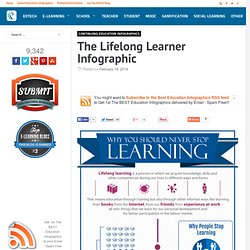
The Lifelong Learner Infographic explores why you should never stop learning, the perceived barriers of lifelong learning as well as its benefits and provides tips on how to become a lifelong learner. Via: www.professionalacademy.com Embed This Education Infographic on your Site or Blog! Copy and Paste the following code! <a href=" title="The Lifelong Learner Infographic"><img width="700" height="2333" src=" class="attachment-progression-single-uncropped wp-post-image" alt="Why-You-Should-Never-Stop-Learning-Infographic"/></a><br/><small>Find more <a href=" title="The No.1 Source for the Best Education Infographics">education infographics</a> on e-Learning Infographics</small>
The World As Your Campus: Design A General Ed Curriculum for Life. One of the biggest hurdles people face when embarking on a journey of self-education is deciding what to learn. There are so many possibilities that it’s difficult to narrow down the options. If you still don’t know what you want to focus your self-studies on, may I suggest you take a bit of time for “general education.” In college, we think of general education as the series of courses one must take to get a broad understanding of academics. Classes like English, math, and history, help students of all disciplines share a common base of knowledge. In the “world campus,” a general education is anything that helps you explore your own interests and share a common understanding with humanity. An inspiring essay from William Upski Wimsatt, published in Utne Reader, explores one self-educator’s personal curriculum: “I…enrolled as a student at the University of Planet Earth, the world’s oldest and largest educational institution.
Here’s my curriculum: Live in a different city every year. The Joy of Practical Learning…What Can You DO? An unfortunate number of people graduate from high school or college with a lot of knowledge and no practical ability. I’m a firm believer that practical learning (i.e. the ability to do something) is just as important as academic learning (i.e. knowledge about something). Practical learning encompasses anything that helps someone master a skill or ability. It includes skills that are sometimes considered drudge work…cooking, painting, fixing a car. Learning Strategies.